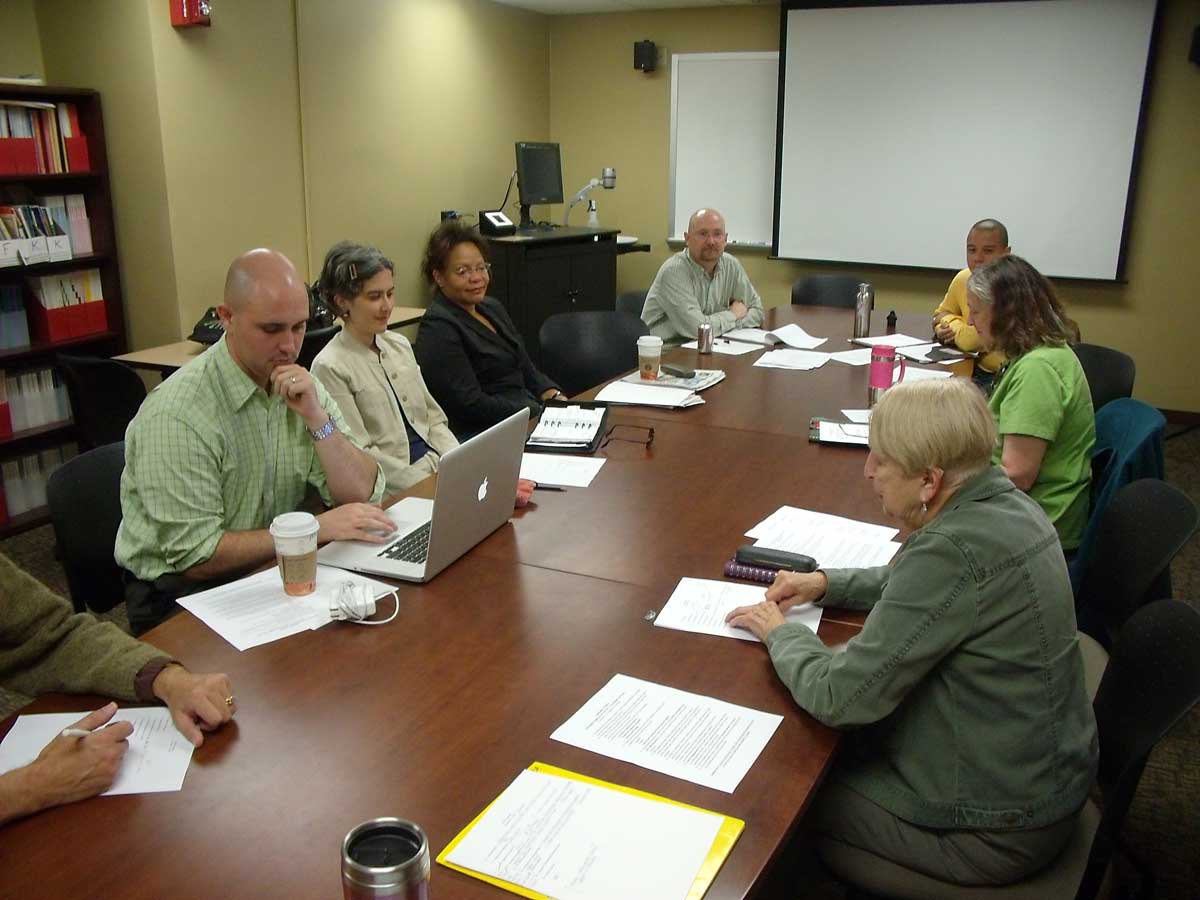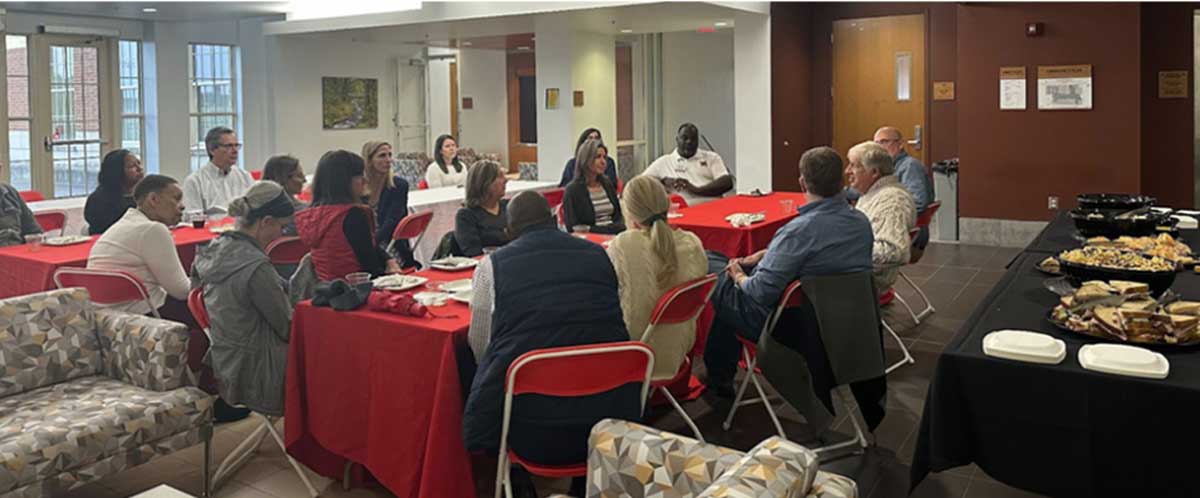Kevin Bush
Email: bushkr@MiamiOH.edu
Phone: 513-529-0405
Office: McGuffey 207C
Miami University
Oxford, OH 45056
Robin Schaps Heinsen, Ph.D., is an Assistant Professor of Music Education at Miami University. She earned her Ph.D. in Music and Human Learning from the University of Texas at Austin and her B.M. and M.M. in Music Education from the University of Georgia. Her teaching responsibilities include woodwind and brass methods, undergraduate music education courses, and supervising student teachers.
Heinsen's research interests include cognition of expert and novice teachers, preservice teacher skill development, learner-centered pedagogy, and lifelong music learning. She uses eye tracking technology to study attention allocation and momentary thought processes of music teachers and shares her work consistently at national and international music conferences and in research journals.
Cara Dillon, Ph.D., is a graduate of the University of Cincinnati's School Psychology program and completed her post-doctoral work at Ohio University's Center for Intervention Research in Schools. Her research focuses on the intervention fidelity of academic and behavioral interventions and supports in schools. Her secondary research focus is on integrating technology within graduate student training. She is also a member of Division 16's Women in Psychology committee and has been involved in NASP communities and Interest Groups.
Darwin A. Guevarra, Ph.D., is an Assistant Professor in the Department of Psychology at Miami University, where he directs the Affective Science and Psychophysiology Laboratory (ASP Lab). Guevarra completed his doctoral training in social psychology at the University of Michigan after obtaining his B.A. in psychology at San Francisco State University.
Guevarra is broadly interested in affect and affect regulation processes and their implications for psychological and physical health.
 The 2025 Summer Grant Workshop, Are Foundations the Answer to the Research Funding Crisis? (Spoiler Alert: Probably Not), was a half-day workshop open to faculty and students. This workshop focused on teaching the basics of producing a grant proposal, the importance and basics of a grant project evaluation, how to search for funders, and a discussion of what makes foundation funders and applications different from state or federal funders. The workshop team included a panel of Miami faculty, including speakers from the Discovery Center.
The 2025 Summer Grant Workshop, Are Foundations the Answer to the Research Funding Crisis? (Spoiler Alert: Probably Not), was a half-day workshop open to faculty and students. This workshop focused on teaching the basics of producing a grant proposal, the importance and basics of a grant project evaluation, how to search for funders, and a discussion of what makes foundation funders and applications different from state or federal funders. The workshop team included a panel of Miami faculty, including speakers from the Discovery Center.
In April, the CHDLT Spring Research Talks presentations were featured from Faculty Associates Tamika McElveen, Ph.D., an Assistant Professor of Psychology at Miami University, and Christopher Wolfe, Ph.D., a CHDLT Co-Director and Professor within the Psychology Department at Miami
The first presentation at the Spring Research Talks was delivered by McElveen. Her research examines the social and cultural influences on child and adolescent development. Her non-profit work promotes the positive leadership and academic development of minoritized youth. McElveen’s presentation was titled “Predicting Math Skills Development Through Intervention.” For questions about her research, please feel free to contact McElveen at mcelvet@MiamiOH.edu.
The second presentation at the Spring Research Talks was delivered by Wolfe. His research focuses on higher-order cognition, the psychology of writing and conceptual learning, and cognitive technologies. Wolfe has also conducted psychological research on reasoning and argumentation, interdisciplinary writing and thinking, judgment and decision-making, analogical reasoning, Web-based interventions, and the assessment of learning and teaching. Wolfe’s presentation was titled “Distinguished from Shinola: Signal Detection Analysis of Individual Differences in Pseudo-Profound Bullshit Discrimination.” For questions about his research, please feel free to contact Wolfe at wolfecr@MiamiOH.edu.This year, the CHDLT hosted Research Talks in both the Fall and Spring semesters via in-person modality. In November, presentations were featured from new Faculty Associates Cara Dillon, Ph.D., and Darwin Guevarra, Ph.D.
The first presentation at the Fall Research Talks was delivered by Dillon. Dillon joined the CHDLT in the Fall semester of 2024. She is an Associate Professor in the Educational Psychology Department. She is a graduate of the University of Cincinnati's School Psychology program and completed her post-doctoral work at Ohio University's Center for Intervention Research in Schools. Dillon’s current research centers around intervention fidelity of academic and behavioral interventions, as well as integrating technology within graduate student training. Dillon’s presentation was titled “Artificial Intelligence and Consultation Training.” For questions about her research, please feel free to contact Dillon at dillonc7@MiamiOH.edu.
The second presentation at the Fall Research Talks was by Guevarra. Guevarra joined the CHDLT as a Faculty Associate in the Fall semester of 2024. Guevarra is an Associate Professor within the Psychology Department at Miami, including his role in directing the Affective Science and Psychophysiology Laboratory (ASP Lab). Guevarra completed his doctoral training in social psychology at the University of Michigan after obtaining his B.A. in psychology at San Francisco State University. His current research focuses on affect and affect regulation processes, as well as their implications for psychological and physical health. Guevarra’s presentation was titled “Low-effort affect regulation: Harnessing regulation nudges and placebo effects to manage distress.” For questions about his research, please feel free to contact Guevarra at guevarda@MiamiOH.edu.
The Doris Bergen Center upheld the long-standing tradition of the Fall Luncheon this year. In October, Faculty Associates across various disciplines and colleges met in McGuffey Hall to connect over research and share a meal. For many new Faculty Associates, this luncheon was their first formal introduction to the Center and the Faculty Associates outside of their own departments. The CHDLT co-directors, Christopher Wolfe, Ph.D., and Kevin Bush, Ph.D., provided insight into the Center’s mission and highlighted goals for the year.
The luncheon is a staple event in Center history, providing intentional opportunities for networking and research collaboration. This ties directly to the Center’s mission in facilitating interaction among faculty researchers from various disciplines, ultimately resulting in interdisciplinary solution-oriented perspectives. We appreciate everyone who was able to take the time this year to stop by the luncheon to share their research initiatives and strengthen the Center’s community!
Interested CHDLT members are welcome to contact us via email at chdlt@MiamiOH.edu or by contacting our Co-Directors
Email: bushkr@MiamiOH.edu
Phone: 513-529-0405
Office: McGuffey 207C
Miami University
Oxford, OH 45056
Email: pollgh@MiamiOH.edu
Phone: 513-529-2505